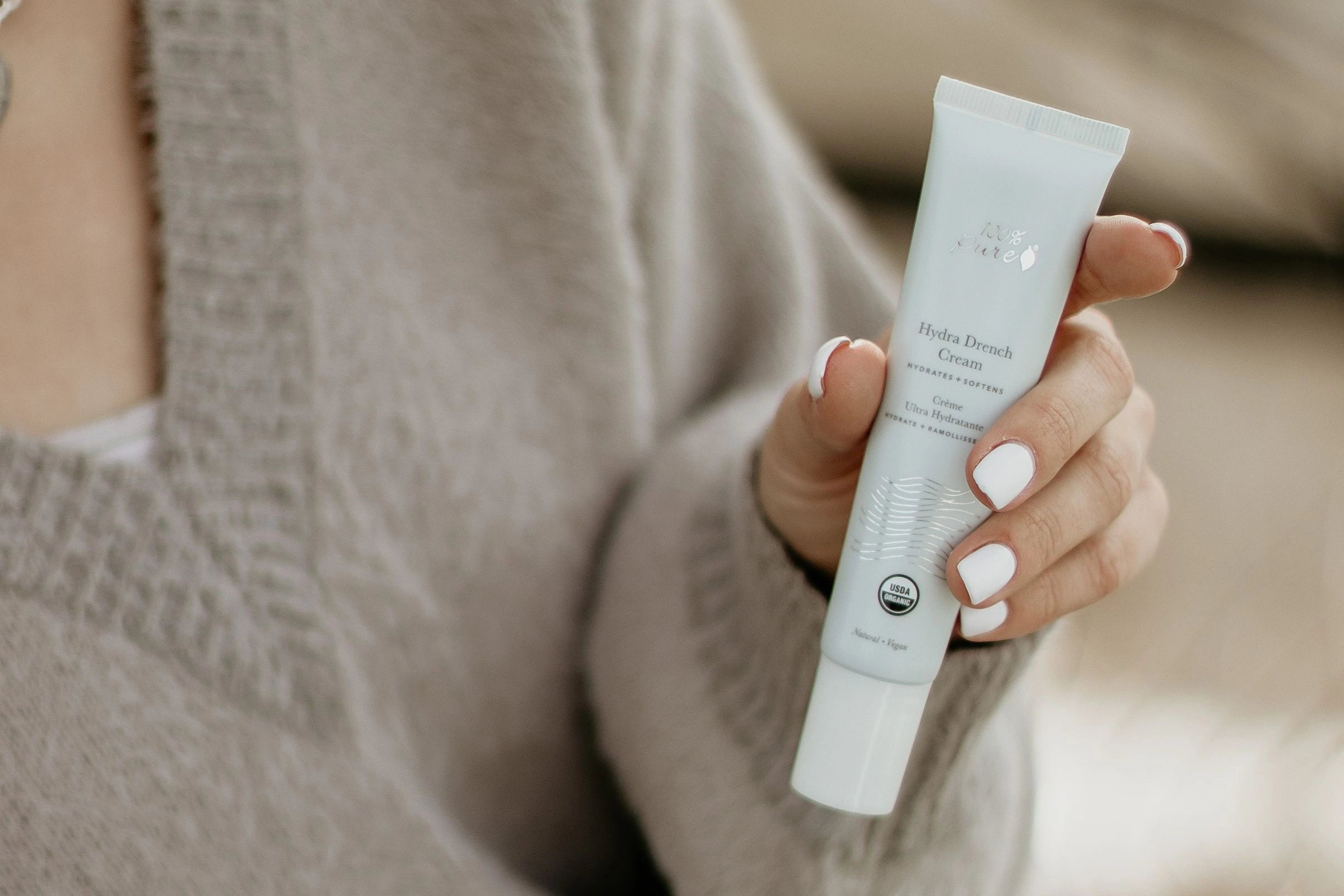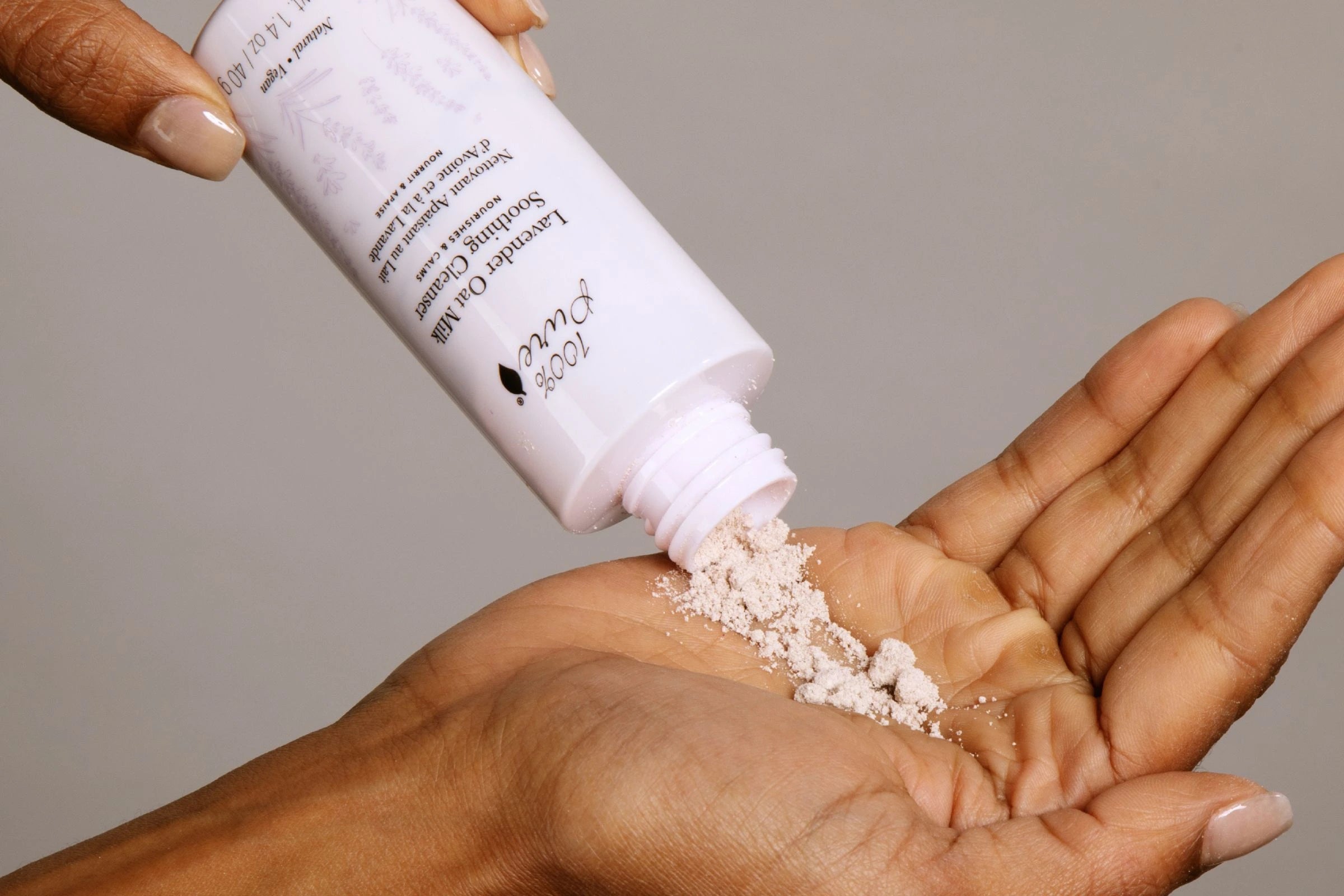Navigate the Path to Soothed Skin: Understanding and Managing Eczema Naturally
Posted on September 23, 2024 Written by: 100% PURE®

Living with eczema can feel like a relentless, frustrating journey. The itching, inflammation, and flare-ups can turn simple tasks—like getting dressed or sleeping—into daily challenges. It’s more than just a skin condition; eczema affects how you feel physically and emotionally, often lowering self-esteem and making you feel uncomfortable in your own skin.
The visible symptoms of eczema can create a significant emotional burden. From avoiding certain fabrics to navigating social situations where the redness and dryness of your skin are front and center, the impact is far-reaching. It’s not uncommon for those with eczema to feel isolated or less confident, which can affect both personal and professional relationships.
But here’s the good news: managing eczema doesn’t have to feel so overwhelming. In this guide, we’ll demystify the condition—exploring the causes behind flare-ups, identifying common triggers, and diving into the emotional toll it can take. We’ll also look at holistic approaches to managing eczema, from lifestyle changes to skincare products that can help soothe your skin and restore your confidence. By understanding eczema from the inside out, you’ll be better equipped to navigate your skin journey with less frustration and more clarity.
Demystifying Eczema
Eczema can feel like an unsolvable puzzle, but understanding its roots is the first step toward managing it effectively. So, what exactly is eczema? At its core, eczema is a condition that causes the skin to become inflamed, itchy, and irritated. It’s a broad term that includes several different types of dermatitis, each with its own characteristics and triggers.
The most common form of eczema is atopic dermatitis, which often starts in childhood and can persist throughout adulthood. Atopic dermatitis is linked to other allergic conditions like asthma and hay fever, making it part of what’s known as the “atopic triad.” However, eczema isn’t just limited to this one form. Other types include contact dermatitis, caused by direct exposure to irritants or allergens, and dyshidrotic eczema, which leads to small, itchy blisters on the hands and feet. Each form of eczema presents unique challenges, but they all share the common factor of inflamed, uncomfortable skin.
It’s easy to lump all eczema under one label, but understanding the differences between atopic dermatitis and other forms can make a world of difference in treatment. Atopic dermatitis is chronic and often hereditary, marked by periods of intense flare-ups and remission. In contrast, contact dermatitis occurs when the skin comes into direct contact with something that irritates it, like harsh soaps or certain fabrics. Knowing the type of eczema you’re dealing with allows for a more targeted treatment approach, which can bring quicker relief.
Eczema isn’t just a surface-level issue—it runs much deeper, involving both the immune system and genetic factors.
At the heart of eczema is an overactive immune system. When your immune system mistakenly identifies harmless substances as threats, it releases inflammatory chemicals that cause the skin to become red, itchy, and swollen. This constant immune response is why eczema can feel so relentless, with flare-ups often triggered by things as simple as stress, seasonal changes, or certain foods.
Genetics also plays a significant role in the development of eczema. If you have a family history of eczema, asthma, or allergies, your chances of developing the condition increase. However, environmental triggers can exacerbate symptoms, even if genetics set the stage. Everyday factors like pollution, harsh weather, and allergens can weaken the skin’s barrier, making it more prone to irritation and flare-ups.
By understanding these underlying causes—immune responses, genetics, and environmental factors—you can begin to see the full picture of eczema and how best to manage it. In the sections ahead, we’ll break down how you can identify your unique triggers, explore holistic approaches to managing eczema, and review products that can help soothe and protect your skin.

Identifying Eczema Triggers
Managing eczema effectively starts with understanding what sets it off. Triggers for eczema vary from person to person, but they often fall into predictable categories like environmental factors, allergens, lifestyle choices, and even emotional states. Recognizing these triggers is key to reducing flare-ups and regaining control over your skin.
Common Environmental Triggers
Your environment plays a significant role in the frequency and intensity of eczema flare-ups. Everyday factors that seem harmless can actually be the culprits behind your skin irritation. Things like pollution, extreme temperatures, and even household allergens can create the perfect storm for an eczema outbreak.
Allergens and Irritants
Common allergens, such as pet dander, pollen, or mold, can aggravate your skin’s sensitivity. On the other hand, irritants—like harsh chemicals found in cleaning supplies or certain types of soaps—can weaken your skin’s natural barrier. Repeated exposure to these elements can leave your skin vulnerable to inflammation, dryness, and itching.
Climate and Weather Changes
Shifts in weather can also wreak havoc on eczema-prone skin. Cold, dry air can strip your skin of moisture, leading to cracking and flare-ups, while hot, humid weather can cause sweating and irritation. Being mindful of the climate and adjusting your skincare routine accordingly can help protect your skin from these external forces.
Lifestyle Factors
While environmental triggers can be hard to avoid, some lifestyle factors can be adjusted to minimize eczema flare-ups.
Stress and Emotional Triggers
Stress and eczema often go hand in hand. Emotional stress can trigger an immune response that leads to inflammation, causing a vicious cycle of stress and flare-ups. Managing stress through techniques like mindfulness, exercise, or therapy can make a meaningful difference in controlling eczema symptoms.
Diet and Nutrition’s Role in Eczema Flare-Ups
Food may not cause eczema, but it can certainly make it worse. Some people find that certain foods, like dairy, eggs, or gluten, can trigger flare-ups, while others benefit from an anti-inflammatory diet rich in fruits, vegetables, and omega-3 fatty acids. Keeping a food journal can help you pinpoint whether diet is contributing to your skin’s condition.
Hidden Triggers
Sometimes, the things we least suspect are the ones causing problems for our skin. Identifying hidden triggers can be the final piece of the puzzle in managing your eczema.
Clothing Materials and Laundry Products
Certain fabrics, such as wool or synthetic materials, can irritate sensitive skin, causing itching and inflammation. Similarly, the detergents and fabric softeners you use can leave behind residues that trigger flare-ups. Opt for hypoallergenic and fragrance-free laundry products and wear breathable, natural fabrics to reduce the risk of irritation.
Personal Care Products and Cosmetics
Your skincare routine may also be working against you. Personal care products like lotions, soaps, and even cosmetics can contain ingredients—like fragrances, alcohols, or preservatives—that irritate eczema-prone skin. Choosing products labeled as “eczema-friendly” or “hypoallergenic” can help you avoid unnecessary irritation.
By learning to identify and manage your unique eczema triggers, you’ll be better equipped to prevent flare-ups before they start. In the next section, we’ll explore holistic approaches and treatments that can help soothe your skin and restore balance, as well as the products that can support your journey toward clearer, healthier skin.
The Emotional Toll of Eczema
Eczema isn’t just a physical condition—it affects your emotional well-being in ways that often go unnoticed. The constant itch, irritation, and unpredictability of flare-ups can take a heavy toll, not only on your skin but also on your mental health and social life. Understanding the emotional impact of eczema is essential to managing it holistically.
Dealing with Physical Discomfort
The physical discomfort of eczema can be relentless. The persistent itching can disrupt sleep, making it hard to rest and recover. Scratching offers temporary relief but often leads to further inflammation, broken skin, and the risk of infection. Over time, the cycle of flare-ups and healing can leave you feeling drained, both physically and emotionally, which impacts your overall quality of life.
The Psychological Impact of Visible Skin Conditions
The visibility of eczema can weigh heavily on your self-esteem. Red, inflamed patches of skin, especially in exposed areas like the face, neck, or hands, can make you feel self-conscious or embarrassed. You might start to avoid mirrors, or worse, avoid going out altogether. This constant worry about your appearance can contribute to feelings of isolation, anxiety, and even depression. The emotional strain of constantly trying to “cover-up” or “explain” your skin to others only adds to the burden.
Navigating Social Situations and Relationships
Eczema can also complicate social interactions and relationships. The unpredictability of flare-ups may make you hesitant to plan social outings, attend events, or engage in activities that could irritate your skin. You might worry about how others perceive your condition or feel uncomfortable discussing it. These fears can lead to withdrawing from social circles, impacting friendships, romantic relationships, and even professional connections. In turn, this isolation only heightens the emotional toll that eczema already brings.
Recognizing the emotional weight that eczema carries is crucial to a comprehensive approach to managing it. In the next sections, we’ll explore ways to address both the physical and emotional aspects of eczema, including holistic treatments, lifestyle adjustments, and products designed to provide relief—helping you reclaim your skin and your confidence.
Conventional Treatments and Their Limitations
When it comes to managing eczema, conventional treatments are often the first line of defense. They can help control flare-ups and reduce symptoms, but they’re not without their limitations. Understanding both the benefits and drawbacks of these treatments will empower you to make informed decisions about your eczema care.
Over-the-Counter Options
For many, the first step in treating eczema is with over-the-counter (OTC) products. These options are accessible and often offer temporary relief, but they don’t always address the root causes of eczema.
Hydrocortisone Creams and Their Side Effects
Hydrocortisone creams are one of the most commonly recommended OTC treatments. These corticosteroids work by reducing inflammation and relieving itching. However, their effectiveness is often short-lived, and prolonged use can lead to side effects like thinning skin, discoloration, or even resistance to the treatment. Over time, hydrocortisone may lose its effectiveness, leaving your skin vulnerable to flare-ups without offering long-term relief.
Antihistamines and Their Efficacy
Antihistamines, another popular OTC option, are often used to control itching by blocking the histamines your body releases during an allergic reaction. While they can help reduce itching, antihistamines don’t address the underlying inflammation of eczema. They’re most effective when used alongside other treatments but come with their own set of challenges, including drowsiness and limited impact on severe cases of eczema.
Prescription Treatments
When OTC options fall short, prescription treatments are the next step in managing eczema. These treatments are often stronger and more targeted but carry more significant risks, especially when used long-term.
Topical Steroids and Long-term Concerns
Topical steroids are frequently prescribed to manage moderate to severe eczema. These medications work by calming the immune system response that causes flare-ups. While they can be highly effective, they come with long-term concerns. Extended use of topical steroids can lead to skin thinning, stretch marks, and even systemic side effects if absorbed into the bloodstream. Additionally, the body can develop a tolerance, requiring stronger doses to maintain the same level of control.
Immunosuppressants and Their Risks
For more severe cases, doctors may prescribe immunosuppressants such as cyclosporine or methotrexate. These medications work by dampening the immune system to reduce inflammation, providing relief when other treatments fail. However, because these drugs suppress the immune system, they can increase the risk of infections and other serious health concerns, making them a high-risk option for long-term use.
While conventional treatments can provide relief, they often come with limitations and potential side effects. In the next section, we’ll explore holistic approaches that focus on treating the root causes of eczema—helping you manage your symptoms naturally and reduce the need for more aggressive treatments.

Holistic Approaches to Eczema Management
While conventional treatments can offer quick relief, many people seek holistic approaches that address the underlying causes of eczema and promote overall skin health. A combination of a gentle skincare routine, natural remedies, and lifestyle modifications can make a world of difference in managing eczema and reducing flare-ups.
Skincare Routine Essentials
A good skincare routine is foundational for managing eczema, as it helps strengthen the skin barrier and minimize irritation.
Gentle Cleansing Techniques
Choosing the right cleanser is crucial for eczema-prone skin. Harsh soaps and scrubs can strip your skin of natural oils, exacerbating dryness and irritation. Instead, opt for a fragrance-free, hypoallergenic cleanser with moisturizing ingredients. Using lukewarm water and patting—rather than rubbing—your skin dry helps retain moisture and prevent further irritation.
Moisturizing Strategies for Eczema-Prone Skin
Moisturizing is the cornerstone of eczema management. Applying a thick, emollient-rich cream or ointment immediately after bathing can lock in moisture and protect the skin’s barrier. Look for products containing ingredients like ceramides, which help repair the skin barrier, and avoid lotions with alcohol or artificial fragrances, which can irritate sensitive skin. For particularly dry areas, you may benefit from the “soak and seal” method, where you apply a heavy layer of moisturizer to damp skin, then cover it with a protective layer like bandages or clothing to enhance absorption.
Natural Remedies and Ingredients
Many people turn to natural remedies to soothe irritated skin and reduce inflammation, and some ingredients have been shown to offer real relief.
Colloidal Oatmeal and Its Soothing Properties
Colloidal oatmeal is a time-tested remedy for calming itchy, inflamed skin. It forms a protective layer on the skin, helping to lock in moisture and reduce irritation. You can find it in many eczema-specific products, or you can add it to a lukewarm bath to soothe widespread flare-ups.
Essential Oils with Anti-inflammatory Benefits
Certain essential oils, such as tea tree oil, lavender oil, and chamomile oil, have anti-inflammatory properties that can help calm eczema-prone skin. However, essential oils should always be used with caution. They must be diluted in a carrier oil, such as coconut or jojoba oil, before being applied to the skin to avoid irritation. Patch testing is also recommended to ensure your skin doesn’t react negatively.
Lifestyle Modifications
Since eczema is often influenced by external factors, making lifestyle changes can significantly reduce the frequency and severity of flare-ups.
Stress Reduction Techniques
Stress is a known trigger for eczema flare-ups, so finding ways to manage stress can be transformative. Techniques such as mindfulness, meditation, yoga, and regular exercise can help reduce cortisol levels in your body, which in turn may lessen inflammation and skin irritation. Incorporating relaxation techniques into your daily routine can make a real difference in your overall well-being and skin health.
Dietary Changes and Supplements
What you eat can also play a role in managing eczema. An anti-inflammatory diet rich in omega-3 fatty acids, antioxidants, and fiber may help reduce skin inflammation. Foods such as salmon, flaxseed, leafy greens, and berries are all excellent choices. Some people with eczema also find relief by eliminating common food triggers like dairy, gluten, or eggs, though it’s important to work with a healthcare provider to identify potential dietary triggers.
Additionally, supplements such as probiotics, vitamin D, and omega-3 fatty acids have been studied for their potential to support skin health and reduce eczema symptoms. Probiotics, in particular, may help balance the immune system and reduce flare-ups, especially in people with atopic dermatitis.
100% PURE Eczema-Friendly Products
Finding skincare products that don’t just soothe but actively help manage eczema can be a game-changer. 100% PURE offers a selection of eczema-friendly products designed to calm irritation, lock in moisture, and protect sensitive skin. Below, we’ll explore how each product can support you on your journey to healthier, more comfortable skin.
French Lavender Nourishing Body Cream
This is a perfect solution for full-body eczema care. Formulated with calming French lavender, it offers a natural way to soothe irritation while deeply hydrating the skin. The nourishing blend of plant oils and butters works to restore moisture, helping your skin feel soft and comforted all day long. Lavender’s anti-inflammatory properties can also ease redness and itching, making this a great option for daily use on eczema-prone skin.
Honey Almond Hand Buttercream
For those whose hands suffer from eczema, this offers targeted relief. The honey almond formula provides a thick, nourishing layer of hydration that helps repair dry, cracked skin. Honey is known for its healing and anti-inflammatory properties, while almond oil deeply nourishes without leaving a greasy residue. Regular application can help restore moisture and protect your hands from further irritation, especially during colder months or after frequent hand washing.
Lavender Oat Milk Soothing Cleanser
Cleansing is a vital step for eczema care, but harsh cleansers can strip away essential moisture. Our is formulated to gently cleanse without aggravating sensitive skin. Oat milk is known for its soothing properties, while lavender helps calm inflammation. Together, they create a calming cleanser that removes impurities while leaving the skin hydrated and balanced, making it ideal for daily use.
Restorative Sea Culture Replenishing Serum
Eczema often results from a weakened skin barrier, which makes our a powerful tool for repair. Packed with nutrient-rich marine ingredients, this serum delivers essential vitamins, minerals, and hydration to the skin. Its lightweight formula absorbs quickly, working beneath the surface to strengthen your skin’s defenses. Over time, it can help repair damaged areas and protect against future flare-ups, making it a must-have in any eczema skincare routine.
Hydra Drench Cream
Eczema-prone skin is often dry and in desperate need of hydration. Our offers intense moisture in a lightweight formula, making it perfect for everyday use without feeling heavy on the skin. Infused with natural ingredients like hyaluronic acid and squalane, this cream helps your skin retain moisture, preventing the dryness that triggers flare-ups. It’s a soothing, gentle solution for those seeking long-lasting hydration without irritation.
Your Empowered Eczema Management Journey
Living with eczema can feel overwhelming, but understanding your skin and how to care for it is the first step toward relief. Throughout this guide, we’ve covered key strategies that can empower you to manage your eczema more effectively. From identifying triggers and understanding the emotional toll to exploring holistic and conventional treatments, you now have the tools to take control of your skin health.
Recapping the essentials, we’ve learned that eczema management starts with knowing your triggers—whether environmental, emotional, or dietary—and continues with building a tailored skincare routine that keeps your skin hydrated and protected. Whether you choose conventional treatments, natural remedies, or a combination of both, you have the power to reduce flare-ups and soothe irritated skin.
As you move forward on your eczema management journey, remember that consistency and self-awareness are key. Don’t hesitate to adjust your routine as needed, and listen to what your skin is telling you. With the right approach, you can manage eczema in a way that fits your lifestyle, helping you feel more comfortable and confident in your skin.
You deserve to live a life free from the stress and discomfort of eczema, and now you have the knowledge to make that possible.
Frequently Asked Questions
Can eczema be cured completely?
Unfortunately, there is no complete cure for eczema at this time. However, eczema can be effectively managed with the right combination of skincare, lifestyle changes, and treatments. Many people experience long periods of relief from symptoms by identifying triggers and using both conventional and holistic approaches to manage flare-ups.
How can I prevent eczema flare-ups during seasonal changes?
Seasonal changes can be a common trigger for eczema. To prevent flare-ups, adjust your skincare routine to suit the climate. In colder weather, use thicker, emollient-rich moisturizers to combat dryness, and in warmer weather, opt for lighter, non-comedogenic lotions. Keeping your environment stable—such as using a humidifier during dry winter months—can also help. Don’t forget to layer up or down appropriately, as temperature extremes can aggravate sensitive skin.
Are there specific foods I should avoid if I have eczema?
Certain foods can trigger eczema flare-ups, although triggers vary from person to person. Common culprits include dairy, eggs, gluten, soy, and nuts. An elimination diet, under the guidance of a healthcare provider, can help you identify any food sensitivities. Incorporating anti-inflammatory foods such as leafy greens, fish high in omega-3s, and antioxidant-rich fruits may also support skin health.
Can stress really trigger eczema, and if so, how can I manage it?
Yes, stress is a well-known trigger for eczema. When you’re stressed, your body releases cortisol, which can cause inflammation and lead to eczema flare-ups. To manage stress, consider incorporating relaxation techniques like meditation, yoga, deep breathing exercises, or even regular physical activity. Managing your stress levels can have a profound effect on reducing the frequency and severity of your flare-ups.
Is it safe to use natural remedies alongside prescribed eczema treatments?
In most cases, natural remedies like colloidal oatmeal or diluted essential oils can be used safely alongside prescribed eczema treatments, but it’s always important to check with your healthcare provider first. Some natural remedies may interact with medications or cause irritation if not used properly. Always do a patch test when introducing a new product to ensure it’s safe for your skin.




